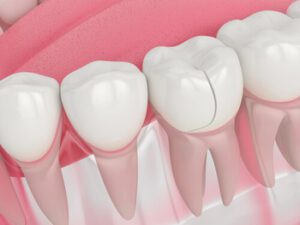When it comes to oral health, the complex interactions between various structures of the mouth and jaw often lead to unexpected symptoms. One such connection is between the temporomandibular joint (TMJ) and tooth pain. Can TMJ cause tooth pain? The answer is yes, but understanding how and why, as well as discovering ways or techniques to relieve dental pain, requires a closer look at the mechanisms behind this discomfort.
This article explores the intricate link between TMJ disorders and tooth pain, delving into the causes, symptoms, and potential remedies to help you regain comfort and functionality.
What is the TMJ and Why Does It Matter?
 The temporomandibular joint (TMJ) is a pivotal structure connecting the jawbone to the skull. This joint facilitates essential movements like chewing, speaking, and yawning. Any dysfunction in the TMJ can lead to a condition known as temporomandibular disorder (TMD or TMJ disorder), which can affect jaw movement and cause a variety of symptoms.
The temporomandibular joint (TMJ) is a pivotal structure connecting the jawbone to the skull. This joint facilitates essential movements like chewing, speaking, and yawning. Any dysfunction in the TMJ can lead to a condition known as temporomandibular disorder (TMD or TMJ disorder), which can affect jaw movement and cause a variety of symptoms.
The Role of the TMJ in Dental Health
- Control Jaw Movement: The TMJ controls jaw function, which is vital for proper mastication and speech.
- Link to Muscle Tension: The surrounding jaw muscles, including mastication muscles, are closely tied to this joint. TMJ disorders often involve these muscles, leading to widespread discomfort.
How TMJ Disorders Cause Tooth Pain
TMJ-related tooth pain is often a type of referred pain. Unlike dental pain caused by direct tooth issues, referred pain originates from another area but feels as though it is coming from the teeth. Here’s how TMJ discomfort can cause tooth pain:
1. Jaw Muscles and Trigger Points
TMJ disorders often cause jaw tension and muscle tightness. Irritating trigger points in the jaw muscles can form, leading to pain that radiates upward into the teeth or downward into the neck and shoulders.
2. Teeth Grinding and Clenching
Teeth grinding (bruxism) and clenching, often associated with TMJ disorders, can wear down tooth enamel and create sensitivity. The force exerted during these habits can cause aching pain and even damage dental structures.
3. Misalignment of the Jaw Joint
A misaligned jaw joint can put uneven pressure on certain teeth, resulting in TMJ-related tooth pain that mimics the discomfort of an infected tooth or gum disease.
4. Impact on Facial Muscles
TMJ pain can extend to the facial muscles, creating orofacial pain that feels similar to a toothache. This overlapping pain often makes it challenging to differentiate TMJ pain from dental pain.
Recognising TMJ Symptoms That Overlap with Tooth Pain
Understanding the symptoms of TMJ disorders can help identify whether your tooth pain is TMJ-related. Common TMJ symptoms include:
- Jaw Pain and Stiffness: Pain in the jaw joint, especially during movement.
- Tooth Sensitivity: Teeth may feel suddenly overly sensitive due to worn tooth enamel or grinding.
- Facial Pain: Discomfort radiating across the entire face.
- Pain Radiates Downward or Upward: TMJ discomfort can travel to nearby areas, including the upper molar teeth.
- Jaw Clicking or Popping: Audible sounds when opening or closing the jaw.
- Limited Jaw Function: Difficulty chewing or moving the jaw smoothly.
Differentiating TMJ Pain from Dental Pain
To effectively address your discomfort, it’s essential to distinguish TMJ-related tooth pain from other causes of dental pain. Here are some tips to differentiate:
- Dental Pain: Often localised to a single tooth and worsens with hot or cold foods, indicating a tooth infection or receding gums.
- TMJ Pain: More diffuse, often accompanied by jaw tension, and may worsen with jaw movement or teeth clenching.
How to Alleviate TMJ Pain and Tooth Pain
The good news is that TMJ tooth pain can be managed with the right strategies. Here are some approaches for effective pain relief:
1. At-Home Remedies
- Hot or Cold Compress: Alternating between hot and cold compresses can reduce inflammation and muscle tension.
- Relaxation Techniques: Exercises like TMJ massage and jaw stretches can alleviate pain and improve jaw function.
- Prevent Teeth Grinding: Using a dental splint or mouthguard can minimise grinding and protect your teeth from damage.
2. Professional Treatments
- Splint Therapy: A dental professional can provide a custom splint to stabilise the jaw and relieve TMJ symptoms.
- Physical Therapy: Techniques to relax the mastication muscles and improve jaw movement can be highly effective.
- Muscle Relaxants: In some cases, medications may be prescribed to reduce muscle tension and alleviate pain.
- Dental Crowns: If worn tooth enamel or altered tooth shape is causing discomfort, dental crowns can help restore function.
3. Long-Term Solutions
- Addressing Complex Dental Procedures: Resolving dental issues like misaligned teeth or gum disease can help.
- Seeking Medical Care: For persistent or severe TMJ-related pain, consulting an experienced health professional is crucial.
- Lifestyle Changes: Reducing stress and avoiding irritating trigger points can help prevent long-term TMJ pain.
TMJ Disorders and Oral Health: A Delicate Balance
TMJ disorders can have far-reaching effects on your oral health. Beyond causing tooth pain, they may lead to conditions like gum disease or exacerbate existing dental issues. Maintaining good oral hygiene and addressing TMJ symptoms early are key to preventing complications.
How to Prevent TMJ Pain from Affecting Your Teeth
 Preventative measures can go a long way in protecting your teeth from TMJ-related pain. Consider these tips:
Preventative measures can go a long way in protecting your teeth from TMJ-related pain. Consider these tips:
- Manage Stress: Practise relaxation techniques to minimise teeth clenching and jaw tension.
- Protect Your Teeth: Use a mouthguard during sleep to prevent grinding.
- Regular Check-Ups: Routine visits to your dental professional can help identify issues early and prevent long-term pain.
FAQs About TMJ and Tooth Pain
- Can TMJ cause tooth pain directly?
Yes, TMJ disorders can cause referred pain that feels like it’s coming from your teeth. This is often due to muscle tension, grinding, or jaw misalignment.
- How can I tell if my tooth pain is from TMJ or an actual dental issue?
TMJ-related tooth pain is usually diffuse, affects multiple teeth, and worsens with jaw movement or clenching. Dental pain is often localised and linked to hot or cold sensitivity or an infection.
- Can teeth grinding from TMJ damage my teeth?
Yes, teeth grinding can wear down enamel, cause tooth sensitivity, and even lead to cracks or fractures in severe cases.
- What are the common signs of TMJ disorders?
Symptoms include jaw pain, facial pain, clicking or popping sounds in the jaw, limited jaw movement, and headaches. Tooth sensitivity may also be present.
- How can I relieve TMJ-related tooth pain at home?
Using hot or cold compresses, practising relaxation techniques, and avoiding hard or chewy foods can help manage TMJ discomfort and associated tooth pain.
- Should I see a dentist for tooth pain caused by TMJ?
It’s best to start with a dentist. They can evaluate whether the pain is dental-related or referred from TMJ and refer you to an experienced health professional if needed.
- Can TMJ cause upper molar toothache?
Yes, TMJ-related pain often radiates upward and can feel like an upper molar toothache due to shared nerve pathways.
- Are there dental treatments to help with TMJ-related pain?
Yes, treatments like dental splints, crowns to correct bite issues, and physical therapy can help alleviate TMJ-related discomfort.
- Can untreated TMJ disorders lead to long-term damage?
Yes, prolonged TMJ issues can cause persistent jaw pain, severe tooth damage from grinding, and even impact oral and facial health.
- How can I prevent TMJ pain and protect my teeth?
Managing stress, using a mouthguard, maintaining good posture, and seeking early treatment for TMJ symptoms can help prevent long-term complications.
When to Seek Help for TMJ-Related Pain
If you’re experiencing TMJ pain or suspect it’s causing tooth pain, don’t hesitate to consult a dental professional. Early intervention can prevent the pain from worsening and help restore your comfort.
Final Thoughts
TMJ disorders can indeed cause tooth pain, but with a proper understanding of the symptoms and treatment options, relief is within reach. Whether it’s addressing grinding habits, relaxing tight jaw muscles, or seeking professional help, there are numerous ways to regain control over your dental health.
If you’re struggling with TMJ-related tooth pain or seeking an emergency dentist near Canberra CBD due to sudden discomfort, speak to your dentist for personalised advice, speak to your dentist for personalised advice. Don’t let TMJ discomfort hold you back from a healthy smile and optimal oral health. Contact us at Definitive Dental at (02) 6105 9833 for expert care and guidance tailored to your needs.
References
- Cleveland Clinic. (n.d.). Teeth grinding (bruxism). Retrieved from https://my.clevelandclinic.org/health/diseases/10955-teeth-grinding-bruxism
- Mayo Clinic. (n.d.). Temporomandibular joint (TMJ) disorders: Symptoms and causes. Retrieved from https://www.mayoclinic.org/diseases-conditions/tmj/symptoms-causes/syc-20350941
- Verywell Health. (n.d.). Physical therapy for TMD. Retrieved from https://www.verywellhealth.com/physical-therapy-for-tmd-4582449

